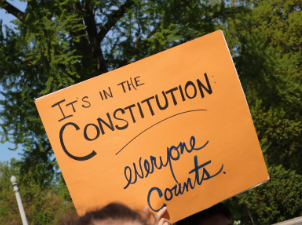
State Voting Restrictions Reinforce the Need for the Democracy Reform
Alex Budzynski
June 21, 2021
Right now, a record number of bills that restrict the vote are moving through state legislatures and becoming law. A recent study from the Brennan Center for Justice found that at least 14 states have enacted 22 restrictive voting bills since January. In particular, Florida, Georgia, and Iowa have introduced overarching bills that further constrict already narrow voting laws. Montana and Arkansas have already ratified four bills apiece, and Arizona has proposed two dozen bills which target voting by mail specifically. Several of these laws are being challenged in court.
The Brennan Center study determined that these provisions stem from “the racist voter fraud allegations behind the Big Lie and a desire to prevent future elections from achieving the historic turnout seen in 2020.” Over 300 restrictive bills have been introduced in 48 states, and 61 bills are currently moving through state governments. With voting rights jumping to the top of state legislative agendas, “the United States is on track to far exceed its most recent period of significant voter suppression” by the end of this year.
States are imposing an assortment of the following provisions making it more difficult to vote in person or to cast ballots in the mail:
- Shortening the timeframe to request and deliver mail ballots
- Making it harder to remain on absentee voting lists
- Eliminating or limiting mail ballots to those who do not specifically request them
- Restricting assistance when returning mail ballots
- Limiting the number and location of mail ballot drop boxes
- Imposing stricter signature requirements for mail ballots
- Tightening voter ID requirements
- Expanding voter purges
- Banning snacks and water at in-person polling stations
- Eliminating same-day registration
- Reducing the availability of polling locations and hours
- Limiting early voting days and times
The principles of Catholic Social Justice insist that all people have a right to participate in our shared public life. Voting should be readily accessible, but these laws make it harder to cast a ballot under the guise of election security. In turn, these bills jeopardize the integrity of our democracy and actively disenfranchise voters.
Moreover, these restrictive laws disproportionately affect marginalized communities, creating hurdles for Black and brown voters, disabled people, immigrants, and low-income folks. A 2019 study published in Scientific American found that voters in predominantly Black neighborhoods waited an average 29% longer than voters in White neighborhoods. Now, states with large minority populations, including Florida and Georgia, have introduced provisions which will continue to suppress minority votes due to technicalities and unchecked intimidation techniques. These policies are rooted in and reminiscent of Jim Crow-era poll taxes and literacy tests. They must be undone to ensure all people have access to the polls.
Organizations across the nation are taking notice of these dangerous and undemocratic pieces of legislation. The Black Votes Matter Fund recently announced their “Freedom Ride for Voting Rights,” a series of events from Jackson, Mississippi to Washington D.C. which will advocate against widespread voter suppression. The organization’s goal “is to increase power in our communities. Effective voting allows a community to determine its own destiny.”
In order to preserve our democracy and uphold the right to vote, we must act. The For the People Act (S.1) is a comprehensive, once-in-a-lifetime bill that protects and expands voting rights, ends partisan gerrymandering, and gets big money out of politics. S.1 would overrule the restrictive laws being passed in states by dictating new, national voting standards that make it easier to vote in person or by mail. NETWORK urges the passage of the For the People Act in the Senate to undo the constricting and oppressive provisions that are being imposed nationwide. The integrity of our democracy is at stake.







